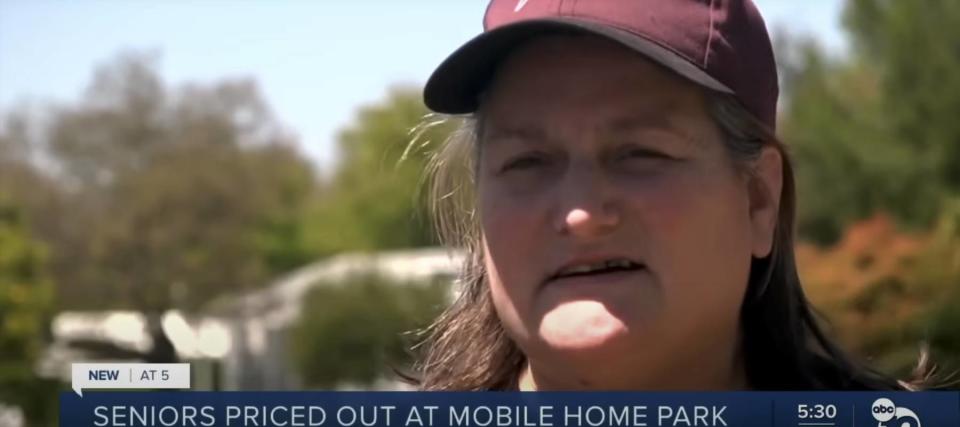Seniors living on fixed incomes say they're being priced out of California mobile home park due to rent hikes

Senior citizens living in a California mobile home park are being forced to ditch their retirement pads due to “unaffordable” rent hikes.
“Nobody wants to move,” Karyn Keyser, a resident at the Skyline Ranch Country Club in Valley Center, told ABC 10 News.
Don't miss
Commercial real estate has beaten the stock market for 25 years — but only the super rich could buy in. Here's how even ordinary investors can become the landlord of Walmart, Whole Foods or Kroger
Cost-of-living in America is still out of control — use these 3 'real assets' to protect your wealth today, no matter what the US Fed does or says
Car insurance rates have spiked in the US to a stunning $2,150/year — but you can be smarter than that. Here's how you can save yourself as much as $820 annually in minutes (it's 100% free)
She described the “upscale” mobile home park as a “fantastic place to live” — with its golf course and other luxurious amenities — but sadly, Keyser says she can’t afford to live there much longer.
Keyser owns her mobile home but rents the plot of land it sits on. She says the rent, without signing a new lease agreement, has gone up from $955 to nearly $1,600.
“I'm on disability; my husband does work, but we still can't afford that much,” she said.
Their plight is shared by other seniors living at the country club. At least some of them rely on a fixed income, according to ABC 10 News, while many, including Keyser, have put their mobile homes up for sale.
Here’s why this once-affordable way of living is now draining away seniors’ savings.
No easy way out
California’s Tenant Protection Act caps rent increases to 10% total or 5% plus the percentage change in the cost of living — whichever is lower — over a 12-month period.
According to the Skyline Ranch Country Club Manager, Chris Ingersoll, the average annual rent increase in the park over the past decade has been 5.5% — with residents seeing hikes in the range of $100 to $400.
Ingersoll told ABC 10 News the 2024 hikes rent are necessary to stop the mobile home park running “at a loss,” adding: “The Park’s analysis took into consideration the fair market values of rents, the expenses required to operate and maintain the amenities of the Park, and the Park’s ongoing and recurring expenses.”
Read more: These 5 magic money moves will boost you up America's net worth ladder in 2024 — and you can complete each step within minutes. Here's how
The club manager said residents were given notice about the increases in December 2023, giving them “enough time to get their financial affairs in order.” But that proved tricky for Keyser and other senior residents who are now looking to sell.
“It seems like every week somebody's putting their house up [for sale],” Keyser said.
With so many people seeking to leave the space, there seems to be no easy way out for the struggling residents of the Skyline Ranch Country Club — and if they want to stay, they’ll have to pay up.
“It's not affordable for some of these people who have lived here 20-30 years now,” Keyser said. “That's what makes me the maddest.”
Homes vs. business
Mobile home parks used to stand out as one of the more affordable living options for seniors on a tight budget.
But while these parks are home to many Americans, they are first and foremost a business for their private owners. And as Ingersoll pointed out, those owners — who have faced a lot of cost pressures recently, due to sticky inflation — want to do much better than just break-even.
In recent years, the mobile home park industry has caught the attention of institutional investors looking to make a quick buck. The Associated Press (AP) reported in 2022 of a nationwide trend of institutional investors — led by private equity firms and real estate investment trusts (REITs) — swooping in to buy mobile home parks and then repeatedly raising rents.
At the time, Benjamin Bellus, an assistant attorney general in Iowa, told the AP: “These industries, including [the] mobile home park manufacturing industry, keep touting these parks, these mobile homes, as affordable housing. But it’s not affordable.”
He added: “You went from an environment where you had a local owner or manager who took care of things as they needed fixing, to where you had people who were looking at a cost-benefit analysis for how to get the penny squeezed lowest … You combine it with an idea that we can just keep raising the rent, and these people can’t leave.”
Today, you can see the same dynamic playing out in single-family home and apartment markets — with corporate landlords accused of buying up properties and driving up rents to make maximum returns.
At least a few lawmakers seem to be paying attention to the crisis. In February, California Assemblymember Alex Lee introduced a bill that would ban companies that own more than 1,000 single-family homes from buying additional properties and converting them into rental units.
What to read next
Jeff Bezos and Oprah Winfrey invest in this asset to keep their wealth safe — you may want to do the same in 2024
Baby boomers bust': Robert Kiyosaki warns that older Americans will get crushed in the 'biggest bubble in history' — 3 shockproof assets for instant insurance now
You don't need to invest like Warren Buffett to get rich — this simple technique tops his returns without taking on more risk
This article provides information only and should not be construed as advice. It is provided without warranty of any kind.

 Yahoo Finance
Yahoo Finance 